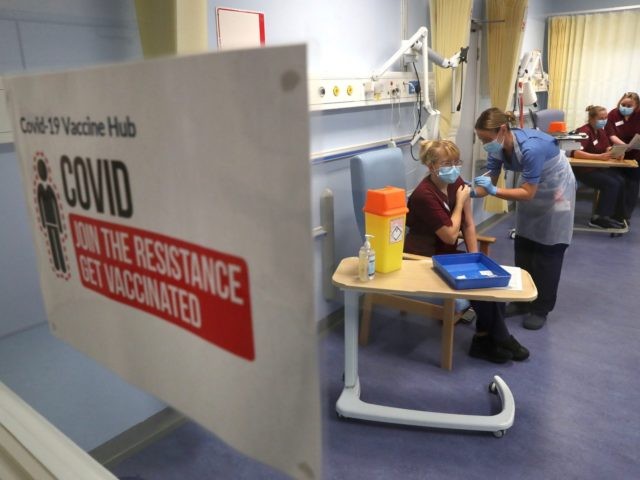A British government advisory committee has advised against people with a “significant” history of allergic reactions from taking the Pfizer/BioNTech vaccine, after two National Health Service (NHS) staff members suffered allergic reactions to the vaccine.
The two healthcare workers developed symptoms of an “anaphylactoid reaction” shortly after being injected with the coronavirus vaccine on Tuesday, the first day of coronavirus vaccinations in the UK.
NHS England said that the two healthcare workers had a history of allergic reactions, requiring them both to carry an adrenaline pen.
After the incident, the national medical director for the NHS in England, Professor Stephen Powis said per the BBC that it is “common” for people to suffer reactions to new vaccines.
“The MHRA have advised on a precautionary basis that people with a significant history of allergic reactions do not receive this vaccination after two people with a history of significant allergic reactions responded adversely yesterday. Both are recovering well,” Powis said.
The Medicines and Healthcare products Regulatory Agency (MHRA), which is responsible for regulating all medicines and medical devices in the UK, issued advice saying that people with a “significant” history of allergic reactions to food, medicine, or vaccines should avoid taking the vaccine for now.
The advice will extend to anyone who needs to carry an adrenaline autoinjector, such as an EpiPen.
The MHRA advice states: “Any person with a history of a significant allergic reaction to a vaccine, medicine or food (such as previous history of anaphylactoid reaction or those who have been advised to carry an adrenaline autoinjector) should not receive the Pfizer/BioNtech vaccine.”
“Resuscitation facilities should be available at all times for all vaccinations. Vaccination should only be carried out in facilities where resuscitation measures are available,” the advice added.
The chief executive of the MHRA, Dr June Raine told the House of Commons Science and Technology Committee that officials were aware of the allergic reactions suffered by the health care workers.
“We know from the very extensive clinical trials that this wasn’t a feature but if we need to strengthen our advice now that we have had this experience in the vulnerable populations … we will get that advice to the field immediately,” Dr Raine said.
A spokesman for Pfizer said that there were “no serious safety concerns” during clinical testing and that the virus was “well-tolerated” by recipients of the injections.
Those with a history of allergic shock join pregnant and breastfeeding women, and children on the no-vaccination list. The MHRA has said it would review these stipulations as more evidence became available.
The British government is planning on vaccinating around 2.5 million people by the end of the year, totaling five million doses of the vaccine.
On Tuesday, the government began administering the first batch of the Pfizer/BioNTech vaccines, of the initial batch of 800,000 doses, after becoming the first Western nation to approve the coronavirus vaccine.
Follow Kurt Zindulka on Twitter here: @KurtZindulka

COMMENTS
Please let us know if you're having issues with commenting.